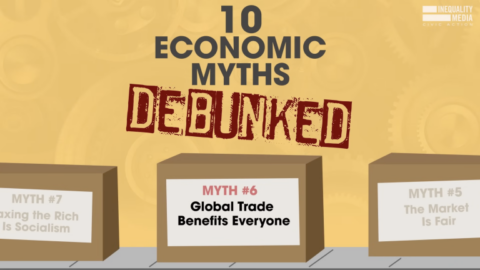At the Foundation for Economic Education, Patrick Carroll responds to a recent Robert Reich rant about the winners and losers under free trade:
Myth #6 on Robert Reich’s list of economic myths is called “Global Trade Benefits Everyone”.
“Have you heard this lie?” Reich opens. “‘Global trade is good for everyone.'” His pants then light on fire. “Ahh!” he screams. “That’s bunk!”
Watching that opening sequence was an immediate déjà vu moment for me, because I had recently come across an article making the same claim as Reich. The article argued that free market economists are simply wrong to claim that “everyone gains” from free trade, because clearly there are some losers.
The ironic part is, that article was written by none other than Bryan Caplan, one of the world’s leading free market economists.
“What makes me so sure that ‘Everyone gains from X’ is invariably a blatant falsehood? Because every change causes price movements, which are automatically bad for someone or other,” Caplan writes. “The Industrial Revolution was great overall, but hurt traditional craftsmen. The Internet is great overall, but hurt travel agents. Congestion pricing is great overall, but bad for cheapskates with high traffic tolerance. Free trade is great overall, but not for workers and investors in industries that can’t survive at world prices.”
[…]
This would be a rather short article if Reich were simply making the same point as Caplan. “I agree, but Caplan said it better,” would probably be my thesis. But alas, Reich goes in a rather different direction than Caplan does, and that’s where some more rigorous analysis is needed. Here’s how he presents his argument:
Many economists believe in the doctrine of comparative advantage, which posits that trade is good for all nations when each nation specializes in what it does best. But what about costs to workers and the environment? What if a country’s comparative advantage comes from people working under dangerous or exploitative conditions, or from preventing them from forming labor unions, or allowing employers to hire young children? Or from polluting the atmosphere or the ocean, or destroying rainforests and polluting groundwater?
Reich makes a fair point that global trade isn’t all sunshine and roses. Working conditions in some places are atrocious, and environmental damage is also a very real problem. But the fact that working and environmental conditions are far from ideal in many parts of the world does not mean that restricting trade will necessarily make things better. In fact, it’s quite likely that less trade would make things worse, because it would cut off the global poor from opportunities for production and economic growth.
Reich highlights the costs of trade, but there are also immense benefits that the global poor reap from the arrangement. If these benefits outweigh the costs — as they likely do in most cases — then who’s really the advocate of the downtrodden: the ones cheering on mutually beneficial trade, or the ones trying to stop it because they can only see the downsides?
To be fair, Reich doesn’t come out and advocate for cutting off trade. But this raises the question: what exactly is he advocating for? Anyone can point out problems, but the real question is: what solution are you proposing? Maybe he’ll tell us in the next section:
My old boss Bill Clinton called globalization “the economic equivalent of a force of nature, like wind or water”. But globalization is not a force of nature. Global trade is structured by rules negotiated between nations about which assets will be protected and which will not. These rules determine who benefits and who is harmed by trade. Over recent decades, trade deals such as the North American Free Trade Act (NAFTA) and agreements under the World Trade Organization (WTO) have protected the assets of US corporations, including intellectual property.
Reich goes on to list a few ways that these rules have helped large corporations, such as oil companies, financial institutions, Big Pharma, and Big Ag.
Watching this part of the video ushered in a second instance of déjà vu. I remembered reading somewhere, just recently, that NAFTA was rotten to the core, just like Reich was saying.
Yet again, it was a staunch free market economist making this point — Murray Rothbard, in a number of incisive articles that were part of his 1995 anthology Making Economic Sense. The problem, said Rothbard, is that NAFTA was really the opposite of free trade.




